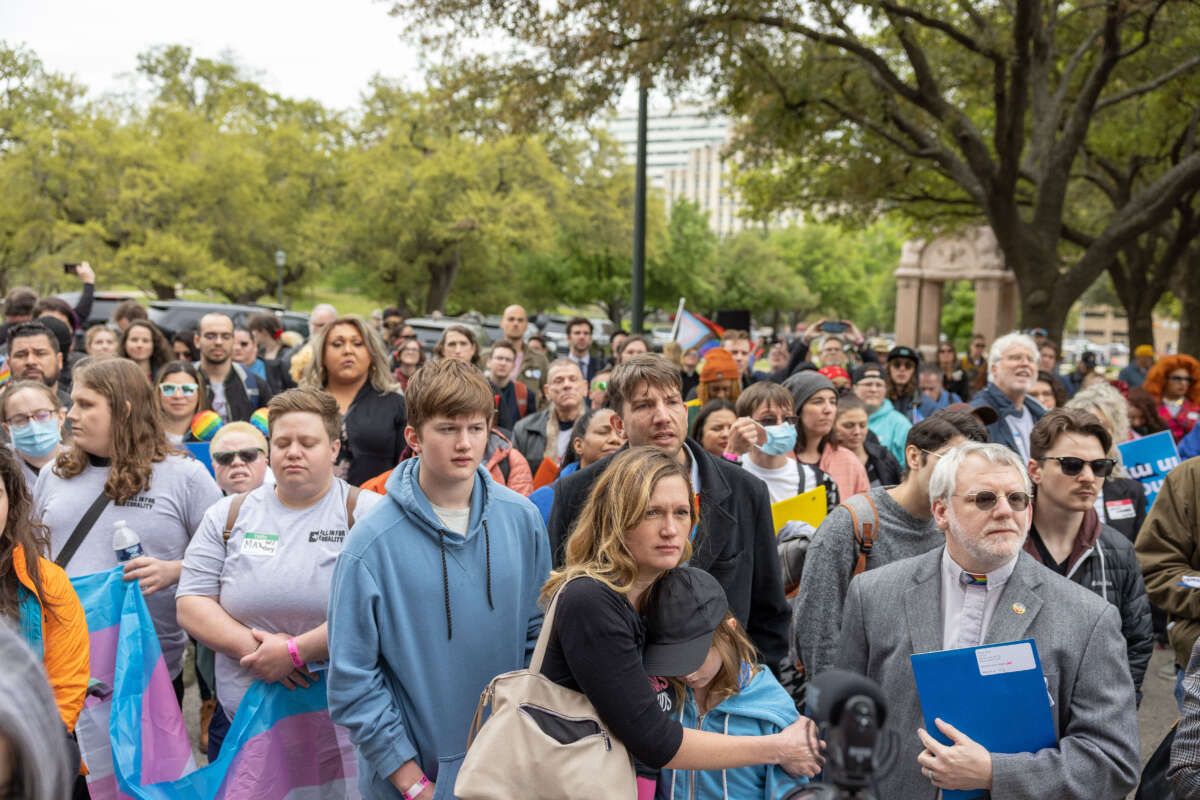The Texas Supreme Court, made up entirely of Republicans, decided Thursday to allow a ban on gender-affirming healthcare for trans youth to take effect on September 1, rejecting an emergency effort by advocacy groups to block the law.
The decision came a week after a Texas district judge temporarily halted the Republican-authored law, arguing that S.B. 14 infringes on the “fundamental right of parents to make decisions concerning the care, custody, and control of their children.”
Texas officials swiftly appealed the district judge’s decision, prompting the rights groups that sued over the law to file an emergency request urging the state’s high court to prevent enforcement of the ban, which Texas Gov. Greg Abbott signed into law in June.
The Supreme Court’s order allowing the law to take effect on Friday offered no explanation for the decision.
As The Associated Press summarized, S.B. 14 “would prevent transgender minors from accessing hormone therapies, puberty blockers, and transition surgeries, even though medical experts say such surgical procedures are rarely performed on children.”
“Children who already started the medications being banned are required to be weaned off in a ‘medically appropriate’ manner,” the outlet added.
Lambda Legal, the American Civil Liberties Union, the ACLU of Texas, Transgender Law Center, and the law firms Scott Douglass & McConnico LLP and Arnold & Porter Kaye Scholer LLP — the organizations that sued the state of Texas over S.B. 14 in July — issued a joint statement on Thursday declaring that “the fight is far from over.”
“Today’s cruel ruling places Texas’ transgender youth, and the families and medical professionals who love and care for them, directly in harm’s way,” the organizations said. “The district court heard two days of testimony, weighed the evidence, and made a reasoned and thoughtful determination that the ban likely violated the Texas Constitution, and thus should be delayed while the full case plays out in court.”
“Inexplicably, the Texas Supreme Court disagreed, and transgender Texas youth and their families are forced to confront the start of the school year fearful of what awaits them,” the coalition added. “The district court clearly articulated the ways in which S.B. 14 likely violates the Texas Constitution by infringing upon the fundamental right of parents to make decisions concerning the care, custody, and control of their children, infringing upon Texas physicians’ right of occupational freedom, and discriminating against transgender adolescents with gender dysphoria because of their sex, sex stereotypes, and transgender status. We couldn’t agree more and look forward to continuing this fight.”
BREAKING: The Texas Supreme Court decided to allow #SB14 to take effect Sept. 1 — banning evidence-based medical care for trans youth.
— ACLU of Texas (@ACLUTx) August 31, 2023
Let’s be clear: Trans youth are loved and belong in Texas.
We won’t stop until this cruel ban is struck down.
With the enactment of S.B. 14, Texas will become one of more than a dozen U.S. states that have imposed legal restrictions on gender-affirming care.
If it was left in place, the district court’s injunction against the law “would have blocked the state attorney general’s office, the Texas Medical Board, and the Texas Health and Human Services Commission from enforcing the law,” The Texas Tribune reported Thursday.
The judge in the case “wrote that transgender youth and their families would ‘suffer probable, imminent, and irreparable injury’ if S.B. 14 went into effect while the legal battle ensues,” the newspaper added. “A trial is set to begin May 6.”
Our most important fundraising appeal of the year
December is the most critical time of year for Truthout, because our nonprofit news is funded almost entirely by individual donations from readers like you. So before you navigate away, we ask that you take just a second to support Truthout with a tax-deductible donation.
This year is a little different. We are up against a far-reaching, wide-scale attack on press freedom coming from the Trump administration. 2025 was a year of frightening censorship, news industry corporate consolidation, and worsening financial conditions for progressive nonprofits across the board.
We can only resist Trump’s agenda by cultivating a strong base of support. The right-wing mediasphere is funded comfortably by billionaire owners and venture capitalist philanthropists. At Truthout, we have you.
We’ve set an ambitious target for our year-end campaign — a goal of $125,000 to keep up our fight against authoritarianism in 2026. Please take a meaningful action in this fight: make a one-time or monthly donation to Truthout before December 31. If you have the means, please dig deep.
